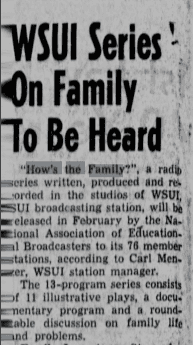Exhibits Children's Media in the NAEB Collection
If there is one program that defined public media it is children’s media. From Sesame Street to Mr. Rogers Neighborhood, to today’s PBS kids app, child-oriented programs are the apotheosis of educational media’s desire to use technology to address social and economic inequality. Its production was aided by consultations with academic experts children’s psychology, behavior, and educational development. But this ethos preexisted the 1967 Public Broadcasting Act and the creation of the CPB; it was also a hallmark of the NAEB.
During the 1950s and 1960s, the baby boom and a national focus on domesticity resulted in an obsessive concern over the status of those children. This period was filled with discussions that inflected upon children. These ranged widely: from new kinds of parenting techniques, such as Dr. Spock’s “natural loving care” approach, to the psychological effects of threat of nuclear annihilation, to the supposed social and cultural decline associated with juvenile delinquency. These topics and more are all part of programming produced by NAEB stations and discussions about children’s media consumption in NAEB documents.
The NAEB manuscript collection contains numerous discussions associated with children’s media consumption. The reformist orientation of the stations meant that they monitored research addressing the impact of commercial media consumption on children, discussed possible alternatives, and then analyzed the reactions to and successes and failures of their own productions. These discussions also extended into the NAEB newsletters, which disseminated the lessons learned by specific stations to the larger group and requested feedback on them.
As befitting their decentralized operation, there are varied points of view and approaches. WSUI in Iowa City, produced How’s The Family?, a show that combined audio drama and experts in child psychology, child welfare, sociology, and social work to address new models of companionate marriage and new models of suburbanization that moved away from intergenerational households and placed mothers alone in the home. Psychologically inflected approaches to parenting also supposed a 1958 program produced by WKAR in East Lansing, MI, Tender Twigs. This show was also heavy on academic expertise and focused on a wide range of topics and programs affecting today’s youth.
Other programs, like WDUQ’s Exploring the Child’s World attempted to thread the needle of addressing concerns about juvenile delinquency – a watchword of the era – while also being sympathetic to the kinds of family dysfunction that could make oppositional identities seem attractive. This program is also remarkable for featuring interviews with “disturbed children” although the ability to tell their stories is framed by the expertise of a professor of educational psychology.
Another show, the Columbia University produced Coming of Age, is remarkable for giving children a voice to describe their own experiences or efforts to effect social change for themselves. In them, one can hear the echoes of programs like today’s Radio Rookies, where children and teens are encouraged to tell their own stories, unframed by the conventions of adult journalists.
Alexander Russo is Associate Professor of Media Studies at The Catholic University of America in Washington, DC. He is the author of Points on the Dial: Golden Age Radio Beyond the Networks (2010 Durham,NC: Duke University Press),as well as numerous articles and book chapters in the fields of radio studies, television studies, sound studies, and the intersection between institutional and cultural histories of media industries.

The Daily Iowan coverage of "How's the Family?" on January 2, 1955.
 advertising a lineup of children's programs offered by KRMA-TV in Denver.](/static/8639219dcd2b252deced8399862207a0/9579b/naeb-b112-f01-17_0005.jpg)
July 1966 NAEB newsletter advertising a lineup of children's programs offered by KRMA-TV in Denver.
, Ohio, from May 2-5, 1947. The meeting included numerous talks and panels about children's programming, including a panel titled ["Is Radio Meeting the Needs of Our Children?"](/document/naeb-b102-f03-08/#8) chaired by [Dorothy Gordon](https://www.nytimes.com/1970/05/12/archives/dorothy-gordon-81-moderator-of-times-youth-forums-is-dead-started.html), creator and moderator of the weekly radio and television program *The New York Times Youth Forums*.](/static/8d326a0f01a8f8988aa9d3db06430d40/3fc79/naeb-b102-f03-08_0000.jpg)
Cover page of the official program of the Seventeenth Institute for Education by Radio, held in Columbus, Ohio, from May 2-5, 1947. The meeting included numerous talks and panels about children's programming, including a panel titled "Is Radio Meeting the Needs of Our Children?" chaired by Dorothy Gordon, creator and moderator of the weekly radio and television program The New York Times Youth Forums.